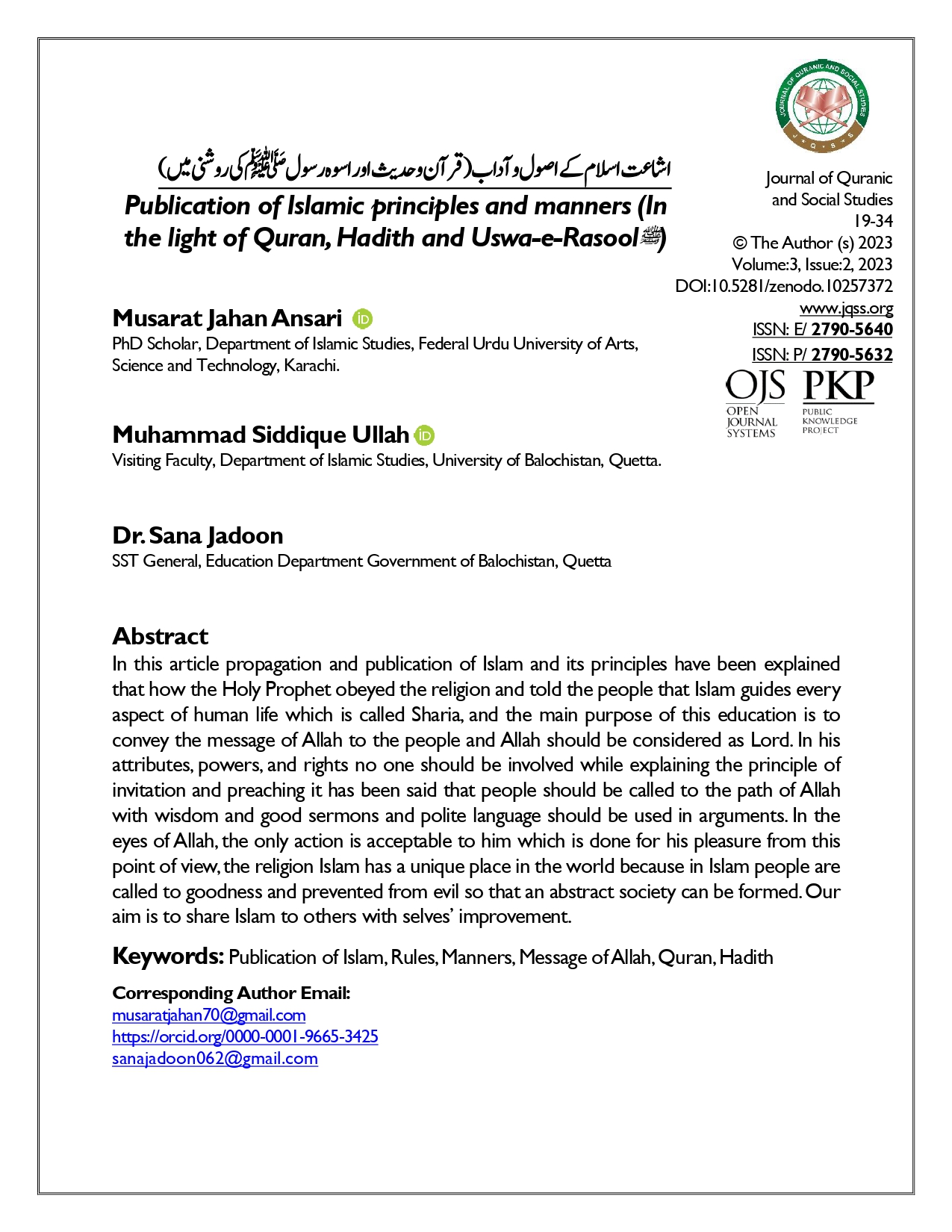اشاعت اسلام کے اصول و آداب (قرآن و حدیث اور اسوہ رسولﷺ کی روشنی میں)
Publication of Islamic principles and manners (In the light of Quran, Hadith and Uswa-e-Rasoolﷺ)
DOI:
https://doi.org/10.5281/zenodo.10257372Keywords:
Publication of Islam, Rules, Manners, Message of Allah, Quran, HadithAbstract
In this article propagation and publication of Islam and its principles have been explained that how the Holy Prophet obeyed the religion and told the people that Islam guides every aspect of human life which is called Sharia, and the main purpose of this education is to convey the message of Allah to the people and Allah should be considered as Lord. In his attributes, powers, and rights no one should be involved while explaining the principle of invitation and preaching it has been said that people should be called to the path of Allah with wisdom and good sermons and polite language should be used in arguments. In the eyes of Allah, the only action is acceptable to him which is done for his pleasure from this point of view, the religion Islam has a unique place in the world because in Islam people are called to goodness and prevented from evil so that an abstract society can be formed. Our aim is to share Islam to others with selves’ improvement.
Downloads
References
Qur'an 36:17.
Ibn Manzoor al-Afriqi, Ahmed bin Makram bin Ali. Lisan al-Arab. Beirut: Dar al-Kutub al-Ilmiyah, 14:261.
Al-Raghib al-Isfahani. Al-Mufredat. Beirut: Dar al-Kutub al-Ilmiyah, 60.
Al-Nisa 4:165.
Al-Baqarah 2:208.
Al-Baqarah 2:85.
Muslim bin al-Hajjaj. Sahih Muslim. Book of Knowledge, Chapter on the Virtues of the Qur'an, 2060/4, Hadith 2674.
An-Nahl 16:125.
Fussilat 41:33.
Ash-Shu'ara 26:214.
Ash-Shura 42:7.
As-Saba 34:28.
Al-Razi, Muhammad bin Umar. Mafatih al-Ghayb. Beirut: Dar Ihya al-Turath al-Arabi, 1420 AH, Vol. 24, 457.
Al-Bukhari, Muhammad bin Ismail. Sahih al-Bukhari. Book of the Virtues of the Qur'an, Hadith 4993. Beirut: Dar al-Kutub al-Ilmiyah.
Aal-e-Imran 3:159.
An-Nur 24:55.
Aal-e-Imran 3:187.
Nuh 71:5.
Al-Asr.
At-Tahrim 66:6.
Aal-e-Imran 3:104.
Al-Ankabut 29:69.
Al-Baqarah 2:256.
Al-Baqarah 2:20.
Muslim bin al-Hajjaj. Sahih Muslim. Book of Faith, Chapter on the Distinctions of Islam and its Various Matters, 1:65, Hadith 40.
Al-Hijr 15:13.
Aal-e-Imran 3:102.
At-Talaq 65:2-3.
Al-A'raf 7:44.
Abu Isa, Muhammad bin Isa. Jami at-Tirmidhi. Book of Tribulations, Chapter on what is mentioned regarding the descent of punishment when people do not change the wrong, 4/2168.
Sijistani, Sulaiman bin Ash'ath. Sunan Abi Dawood. Book of Battles, Chapter on Command and Prohibition, 4/122, Hadith 4339.
Ham al-Sajdah 41:30-32.
Muslim bin al-Hajjaj. Sahih Muslim. Book of Remembrance, Supplication, Repentance, and Seeking Forgiveness, Chapter on the Excellence of Gathering for the Recitation of the Qur'an and for Remembrance, 4/2074, Hadith 2700

Downloads
Published
How to Cite
Issue
Section
License
Copyright (c) 2023 Author

This work is licensed under a Creative Commons Attribution-NonCommercial 4.0 International License.



























